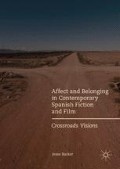Abstract
These fictions employ the metaphor of the home as anchor and prison for the rooted subject in a social context where formerly solid identity discourses are continually dissolving. I relate this metaphor to the importance home ownership has had in Spain as a motor for an illusory prosperity and for new modes of consumerism—brought to light by the 2008 financial collapse and the 15-M Indignados movement, which posed uncomfortable challenges to individualist notions of space. Likewise, these stories employ the home as a focal point between rooted identity and affective belonging. The trappings of individualism tie characters to metaphorical ego-homes. The outside is seen as a space of abject otherness, offering a sublime but frightening sense of belonging.
Access this chapter
Tax calculation will be finalised at checkout
Purchases are for personal use only
References
Ayala-Dip, J. Ernesto. “Desapego emocional.” Review of Mundo maravilloso. El País. April 28, 2007. Web. Aug 21, 2015. http://elpais.com/diario/2007/04/28/babelia/1177717824_850215.html.
Bachelard, Gaston. Poetics of Space. Translated by Maria Jolas. New York: Orion Press, 1964.
Bowlby, John. Attachment and Loss Volume 1: Attachment. London: Pimlico, 1997.
Calvo, Javier. Los ríos perdidos de Londres. Barcelona: Mondadori, 2005.
———. Mundo maravilloso. Barcelona: Mondadori, 2007.
Cassidy, Jude, and Philip R. Shaver, eds. Handbook of attachment: theory, research, and clinical applications. London: Guilford Press, 2008.
Castells, Manuel. The Rise of the Network Society. Oxford: Blackwell, 2000.
Clough, Patricia. Introduction to The Affective Turn. Edited by Patricia Clough and Jean Halley, 1–33. London: Duke University Press, 2007.
DeLanda, Manuel. A New Philosophy of Society: Assemblage Theory and Social Complexity. London: Continuum, 2006.
Deleuze, Gilles. “Postscript on the Societies of Control.” October 59 (1992): 3–7.
Deleuze, Gilles, and Félix Guattari. Anti-Oedipus: Capitalism and Schizophrenia. Translated by Robert Hurley, Mark Seem and Helen R. Lane. London: Continuum, 2004.
———. A Thousand Plateaus: Capitalism and Schizophrenia. Translated by Brian Massumi. London: Bloomsbury, 2013.
Fernández Savater, Amador. “El nacimiento de un nuevo poder social.” Hispanic Review 80, no.4 (2012): 667–81.
Flesler, Daniela. The Return of the Moor: Spanish Responses to Contemporary Moroccan Immigration. West Lafayette: Purdue University Press, 2008.
Hardt, Michael. Gilles Deleuze: an Apprenticeship in Philosophy. Minneapolis: University of Minnesota Press, 1993.
Henseler, Christine. Generation X Remixed: Spanish Fiction in the Digital Age. New York: Palgrave Macmillan, 2011.
Jenkins, Henry. Convergence Culture: Where Old and New Media Collide. New York: New York University Press, 2008.
Johnson, Roy. “A Russian Beauty.” In A Critical Examination of Nabokov's Collected Stories. Mantex, accessed July 01, 2015, http://www.mantex.co.uk/2009/09/26/a-russian-beauty/
Kristeva, Julia. The Powers of Horror: an Essay on Abjection. Translated by Leon Samuel Roudiez. New York: Columbia University Press, 1982.
Lévy, Pierre. Collective Intelligence: Mankind’s Emerging World in Cyberspace. Translated by Robert Bonono. New York: Plenum Trade, 1997.
———. ¿Qué es lo virtual? Translated by Diego Levis. Barcelona: Paidós Ibérica, 1999.
Manovich, Lev. The language of new media. Cambridge: MIT Press, 2002.
Martínez, Gabi. Ático. Barcelona: Destino, 2004.
Massumi, Brian. A User’s Guide to Schizophrenia and Capitalism. Cambridge: MIT Press, 1992.
Mitchell, William J. Me++: The Cyborg Self and the Networked City. Cambridge: MIT Press, 2003.
Moreno Caballud, Luis. “La imaginación sostenible: Culturas y crisis económica en la España actual.” Hispanic Review 80, no.4 (2012): 535–555.
Nabokov, Vladimir Vladimirovich. “A Russian Beauty.” Translated by Simon Karlinsky. In A Russian Beauty and Other Stories, 2–8. New York: McGraw-Hill, 1973.
Ockman, Joan. Review of The Poetics of Space. Harvard Design Magazine 6 (1998): 79–80.
Owen, Susan A. “Vampires, Postmodernity and Postfeminism: Buffy the Vampire Slayer.” Journal of Popular Film and Television 27, no.2 (1999): 24–31.
Ray, Robert M. How a Film Theory Got Lost and Other Mysteries in Cultural Studies. Bloomington: Indiana University Press, 2001.
Risen, James and Laura Poitras. “N.S.A Gathers Data on Social Connections of U.S. Citizens.” NY Times. September 28, 2013. http://www.nytimes.com/2013/09/29/us/nsa-examines-social-networks-of-us-citizens.html
Ryan, Marie-Laure. “Cyberspace, Virtuality and the Text.” In Cyberspace, Textuality, Computer Technology and Literary Theory, edited by Marie-Laure Ryan, 78–107. Bloomington: Indiana University Press, 1999.
Silverman, Kaja. Flesh of My Flesh. Stanford: Stanford University Press, 2009.
Stam, Robert. “The Theory and Practice of Film Adaptation.” Introduction to Literature and Film: A Guide to the Theory and Practice of Film Adaptation, edited by Robert Stam and Alessandra Raengo, 1–53. Malden: Blackwell, 2005.
Stiglitz, Joseph E. Globalization and its discontents. New York: W.W. Norton, 2003.
Tegmark, Max. “Parallel Universes.” Scientific American (May 2003): 41–51.
Tegmark, Max and John Archibald Wheeler. “100 Years of Quantum Mysteries.” Scientific American (February 2001):68–75.
Žižek, Slajov. “Troubles with the Real: Lacan as a Viewer of Alien.” In How to Read Lacan, 61–78. London: Granta, 2006.
Author information
Authors and Affiliations
Corresponding author
Rights and permissions
Copyright information
© 2017 The Author(s)
About this chapter
Cite this chapter
Barker, J. (2017). No Place Like Home: Gabi Martínez’s Ático (Top-Floor Apartment) and Javier Calvo’s “Una Belleza Rusa” (A Russian Beauty). In: Affect and Belonging in Contemporary Spanish Fiction and Film. Palgrave Macmillan, Cham. https://doi.org/10.1007/978-3-319-58969-5_2
Download citation
DOI: https://doi.org/10.1007/978-3-319-58969-5_2
Published:
Publisher Name: Palgrave Macmillan, Cham
Print ISBN: 978-3-319-57964-1
Online ISBN: 978-3-319-58969-5
eBook Packages: Literature, Cultural and Media StudiesLiterature, Cultural and Media Studies (R0)

